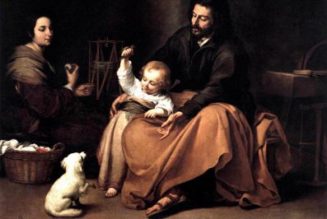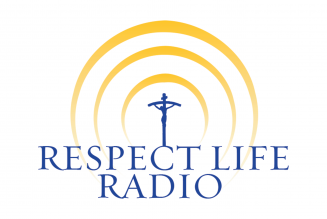Two Steubenville priests made headlines this month, when the Pittsburgh Post-Gazette reported that they have legal custody of a two-year-old boy, who is living at their downtown parish rectory.
A judge will consider the boy’s situation at a custody hearing in October, with the child’s mother reportedly seeking to regain legal care of her son.
But while the outcome of the case has yet to be determined, the situation does raise canonical questions, and has prompted discussion among Catholics about whether priests can take legal custody of children.
So what’s happened? What does canon law say? And what’s next? The Pillar explains.
Ok, so what happened?
According to court documents, Frs. Timothy Huffman and Bradley Greer, both of Steubenville, Ohio, petitioned a court in December 2022 for custody of a then seven-month-old child who had come into their care.
Huffman is the pastor of Steubenville’s St. Peter’s Parish; Greer is chancellor of the Steubenville diocese, and a parochial vicar at Huffman’s parish.
According to their petition, the men met the child, his mother, and her husband in the spring of 2022, when the family moved to Steubenville. They came into contact at the Friendship Room, a resource center close to the parish, for people homeless or experiencing poverty.
The men told the court that in June 2022, the child’s mother, Jordan Pauley, dropped the child off several times at the Friendship Room while returning to her apartment or otherwise leaving the premises, even while the center is not a childcare facility.
Apparently because the environment at Friendship Room is not always suitable for children, the center’s staff eventually asked the priests for help watching him.
In early July 2022, the Friendship Room’s director called the priests, to say that Pauley had left the child overnight with a woman she had just met, whose own children had been removed from her care, according to court filings.
The director herself was out of town, and with apparently nowhere else to take the child, the director asked if the child might stay at the rectory until things could be sorted out. Seemingly concerned for the child’s safety, the priests agreed.
After one day with the child in their care, the court affidavit said, the priests contacted their county social services agency, but, despite several phone conversations, did not receive assistance from the county.
The priests also contacted the Steubenville diocese, sources close to the diocese told The Pillar, and were reportedly given permission to watch the child, given the very unusual circumstances.
After four days, the priests talked with police, asking what they should do about the child left in their care. The next day, after talking with Pauley, a police officer told the priests that she wanted the child to be returned. The child left the rectory that day and returned home, with a brief medical examination conducted by a nurse.
But according to court filings, the child’s mother continued to bring the child to the rectory, or to the Friendship Room, regularly, when she was apparently unable to care for him.
The affidavit said she began regularly leaving the child at the rectory, for an average of four to five nights per week.
A law enforcement official close to the case — who declined to be identified because he was not authorized to speak on the record — told The Pillar that “the priests did everything they were supposed to do. They did everything they could do,” often when there were seemingly few other options for the child’s safety.
The official emphasized that when the priests, and staff at the Friendship Room, contacted local social service agencies with concerns about the child, “the problem is, to be blunt, that nobody came.”
The county’s children’s services agency “never came and conducted an initial investigation,” he added.
“The county wasn’t any help to them, and [the parents] kept bringing [the child] back,” the official said.
The court petition claimed that Pauley watered down formula, fed the child food unsuitable for an infant, and “has very little interaction with the child when she is around him.”
In one case, the priests retrieved the child from Pauley’s apartment when she was drunk “and very upset,” according to the affidavit, and brought him to the rectory, out of apparent concern for the child’s immediate safety.
By late 2022, the affidavit said, the child was being left at the rectory frequently, including for a two-week stint in December 2022, during which “the child [was] at the rectory with the plaintiffs with only occasional visits from the parents.”
The priests themselves declined questions from The Pillar.
But friends close to them say the priests did not seek out care of the child, and that they tried to instead support the child’s mother and her husband in her parenting, as indicated in their custody petition.
The affidavit said the priests purchased groceries, staples, and medicine at area stores for the child’s mother and her husband, at their own expense.
“[The parents] just kind of left the baby with them,” the law enforcement official said, “and the priests would never refuse because they would be concerned about the baby’s safety.”
In his opinion, the law enforcement official said, “what those two guys have done has been for the safety and welfare of that kid.”
By early December 2022, the priests realized the situation was becoming more problematic.
According to the affidavit, they became particular concerned when Pauley told the priests that she was going to take the child to Virginia to visit her father, who had been incarcerated for child abuse, and had only just been released from custody.
That was an emergency, they decided, putting the child in immediate danger. They contacted an attorney, and then petitioned a court for an emergency custody designation for the child.
After the priests petitioned for a custody order, the child’s maternal grandmother, who lived in Pennsylvania, became involved in the case.
Like the priests, she agreed that the child should not remain with his mother.
She filed a motion telling the court that Pauley and her husband were “unfit” and “unable to provide for [the child’s] safety, care, and well-being.” The grandmother offered instead that she was “capable and prepared” to care for the child.
But the court decided otherwise, declaring that the priests, who had filed for the original custody order, should become the “residential parents” for the child while his long-term future was decided, rather than the grandmother.
The men have been legally responsible for the child since.
The issue remains contested in court, with the case eventually moving to a juvenile court, once it emerged that Pauley’s husband was not the child’s father — a detail which, because of the particularities of Ohio law, shifted jurisdiction.
The next custody hearing in the case is scheduled for October.
In the meantime, the child has lived in the parish rectory.
Friends close to the priests say they’ve taken their legal responsibility to care for the child seriously, and have been his primary caregivers, with regular help from only a small group of close friends.
Pauley could not be reached by The Pillar for comment.
Is that allowed, canonically?
Canon law does not explicitly address the possibility of clerics, especially celibate clerics, taking custody of children.
The Code of Canon Law does say that priests are to “refrain completely from all those things which are unbecoming to their state” in life, as ordinarily unmarried ministers of the Gospel, and of the Church’s sacraments.
In Steubenville, there have been some critics who suggest that raising a child in a parish rectory is unbecoming to the clerical state. Others have suggested that the priests are performing a work of mercy, and giving witness to the Church’s enduring care for souls.
Ultimately, deciding that matter is not up to observers, but to the diocesan bishop.
While the Steubenville diocese has declined questions on the matter, it has issued a statement saying that the situation is in conformity with diocesan safe environment policies. And sources say that the priests have kept their bishop informed about the situation at every stage — even while the diocese has experienced two episcopal turnovers in recent years, and is now led by a temporary administrator.
But the prospect of the situation causing public scandal among local Catholics could also potentially impact the priests. A pastor can be removed from office if he loses a “good reputation” among his parishioners, whatever the cause.
The Pillar has spoken in recent days with several St. Peter’s parishioners who say they support Huffman, their pastor, and are edified by his decision to assist the child. But some acknowledged that the priest also has critics in the local community, and that some are likely to raise their concerns to the diocese.
While it’s not clear what will happen in Steubenville, there is precedent for priests having custody of children in the United States, and even adopting them.
In the Church’s history, numerous religious orders of priests and brothers have founded or created homes for children from difficult circumstances. In some periods of history, monasteries were well known to provide homes for children who needed them, where they were often cared for by religious brothers.
And Blessed Fr. Michael McGivney, founder of the Knights of Columbus, became guardian of a boy named Alfred after the boy’s father died.
Perhaps the most famous American priest to adopt a child in the U.S. was Fr. George Clements, a Chicago cleric who adopted a son in 1980, and three more sons thereafter.
Chicago priest Fr. Michael Pfleger is also an adoptive father — In the 1980s and 1990s, the priest adopted two boys from Chicago’s South Side, and was the foster parent to another, Jarvis Franklin, who was killed by gunfire in 1998.
With a growing number of married Latin Catholic priests in the United States — most of them members of the Anglican Ordinariate of the Chair of St. Peter — the phenomenon of children in parish rectories is becoming somewhat more common in the Church’s life than it once was.
What about safe environment policies?
That’s a good question.
Some critics of the Steubenville priests note that both Clements and Pfleger, well-known adopting priests, have also been accused of sexually abusing minors.
Clements, for his part, was in 2019 cleared of accusations both by Illinois’ Department of Children and Family Services, and by an archdiocesan Independent Review Board. Pfleger was investigated twice for child abuse allegations, in 2021 and 2022, was cleared both times, and returned to priestly ministry.
In this case, the Diocese of Steubenville said August 13 that it “is confident that Father Bradley Greer and Father Timothy Huffman are in compliance with the child protection policies of the Diocese of Steubenville because they are the court ordered legal custodians of the minor child.”
In addition to diocesan safe environment policies, it seems likely that the courts will continue to evaluate which living environments are safe for the child as it adjudicates the question of long-term custody.
What happens now?
It seems unlikely there will be any changes to the situation before a court hearing in October. If a judge continues the order placing the child in the care of the priests, it is possible their situation could continue indefinitely.
Pauley told the Pittsburgh Post-Gazette that a county social services investigation into her home concluded in November 2023 that there were no safety threats to the child, but documents to that effect are not available in the public record.
She told the Post-Gazette that she wants to regain custody of her child, and has been working to become a better parent, through therapy and other means.
From an ecclesiastical perspective, it’s worth noting that the diocese is currently led by its second temporary administrator in a row, Bishop Edward Lohse of Kalamazoo, Michigan.
Given uncertainty about the diocese’s future, and the general approach in the Church that sees temporary administrators defer major decisions to the eventual diocesan bishops, it is probable that the status quo will be maintained ecclesiastically until the diocese has a new diocesan bishop, or until there is more clarity about the prospect of its merger.
And since previous bishops have seemingly given the priests permission to take on the legal obligation of custody for the child, it seems unlikely that even a diocesan bishop would interfere lightly in the exercise of that legal obligation.
In the meantime, friends of the priests say that Huffman and Greer have given the child a safe, loving, home, out of sincere love for a child they’ve cared for more than a year.
“These guys are genuinely taking care of him, and everything that comes with taking care of a baby,” one friend of the priests — who declined to be named because of the pending court hearing — told The Pillar.
“They have some people who help, like families do, but the priests are raising him while also running a parish and being present to their parishioners.”
“With the significant amount of time they’ve spent caring for him, their love for [the child, and his for them] has grown.”
Comments 33
Services Marketplace – Listings, Bookings & Reviews








